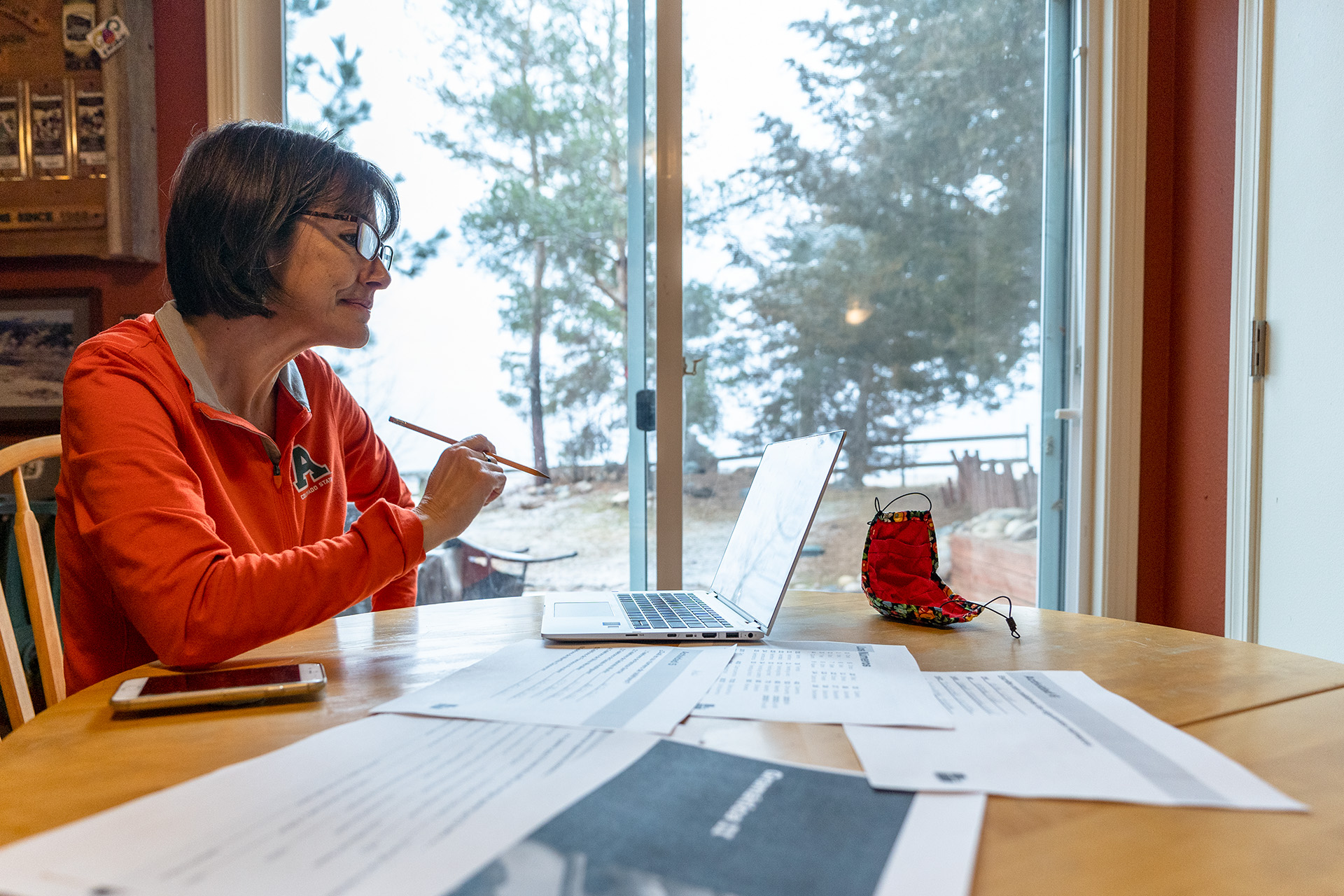
Emily Narvaes Wilmsen at home with her classmates in her online Spanish course. She is the director of communications and strategic marketing for the Walter Scott, Jr. College of Engineering at Colorado State University. Photo by Joe Mendoza/CSU Photography
I saw the email from the Office of International Programs and the CSU Todos Santos Center in early January: “Online Spanish Course 2021 Modules.”
¡Bueno! This could be a nice treat, I thought, after 10 months of working from home with another lonely semester ahead. Plus, it could help me in my job. We have a number of Spanish-speaking faculty and students in the Walter Scott, Jr. College of Engineering, and I’m trying to be more inclusive and uphold the University’s Principles of Community.
The email said, “… suitable for beginners with some previous knowledge.”
Honestly, I had lots of self-doubt. Could I revisit Spanish after leaving it behind in college more than 30 years ago? My maiden name is Narvaes. Wouldn’t I honor my Mexican/Spanish heritage by being more language proficient?
I signed up for the first available class, which met twice a week for the month of February with a limit of 12 students, all employees of CSU. That didn’t seem too scary. How hard could it be?!
In the movie Moneyball, Oakland A’s General Manager Billy Bean (played by Brad Pitt) and the coach offer a washed-up catcher a new job at first base, a position the player doesn’t know how to play.
“It’s not that hard, Scott,” Pitt’s character says to the catcher, and then says to the coach, “Tell him, Washington.”
Coach Washington: “It’s incredibly hard.”
Hard indeed.
Challenging and fun
Relearning a language is pretty much the opposite of riding a bike. If you haven’t been speaking it for a while – like, say, decades – it doesn’t come back overnight or even after a month. Words sound familiar but they feel strange coming off your tongue.
The Todos Santos classes challenge you and help you learn at the same time. Olaf Morales, our language coordinator based at the CSU Todos Santos Center in Baja California Sur, Mexico, helps you embrace that discomfort in a safe environment.
“Relearning a language is pretty much the opposite of riding a bike. If you haven’t been speaking it for a while – like, say, decades – it doesn’t come back overnight or even after a month. Words sound familiar but they feel strange coming off your tongue.”
He knows it’s hard and gently corrects without admonishing. Like when I stumble on words like permítanme (permit me). Per-MEET-an-me not permi-TAN-me. Aha! So, the accent mark’s there for a reason! Got it.
“A new language represents not only learning new structures and forms, but also understanding other people’s beliefs and cultures and this definitely takes some time,” Morales said. “Only if you are willing to make a long-term commitment, just then you will see the results. It will not be easy, and of course it will have its own up and downs, but after a few years, you will see the results and at that point you will realize that it was hard but worth it.”
What’s great about the Todos Santos experience is that you’re not alone. It’s a small group that knows about as much – or little – as you do. You learn together. You go into Zoom breakout rooms to work on speaking with your classmates, usually to practice the words you just relearned for shopping in the supermarket (supermercado) or how to use pronouns (pronombres). You have small homework assignments through Canvas that are fun and help you practice in between classes.
The best part is that Morales teaches you about the culture and the people of Mexico. You’re not learning, “Where do I buy pencils?” You’re learning about the origins of yummy mole (and how to make it from scratch), how to engage in a conversation about price in pesos, and the importance of the Day of the Dead (Dias de Los Muertos) and spirit animals (alebrijes).
You are learning to appreciate another culture.
More opportunities to learn

Narvaes Wilmsen says the Todos Santos experience offers a group learning environment and small homework assignments that are fun. Photo by Joe Mendoza/CSU Photography
I recently attended a virtual panel discussion that included Morales and CSU Spanish Professor Andrea Purdy talking about business ethics in Latin America. The event was co-sponsored by the College of Business and the College of Liberal Arts. Purdy shared a great slide on “Why Another Language and Culture?”:
- Connects you with our shared human experience across borders often lost in translation
- Builds trust if you speak someone else’s language
- Improves your decision-making
- Increases your perception
- Promotes dialogue, encourages tolerance and adaptability, and stimulates social change
- Makes you more competitive in the global marketplace.
Yes! And learning a language totally got me out of my own lonely environment and reduced my stress in quarantine. I had so much fun in the first module in February, I enrolled in the second module in March.
Morales said he’s planning a third module, and told us about the one-week Spanish immersion course held at the CSU Todos Santos Center in 2018 and 2019. For 2021, they’re planning four weeks of Spanish online and a week in Todos Santos, pandemic permitting
A word to the wise: Better hurry when it goes live. I’m going to be first in line.